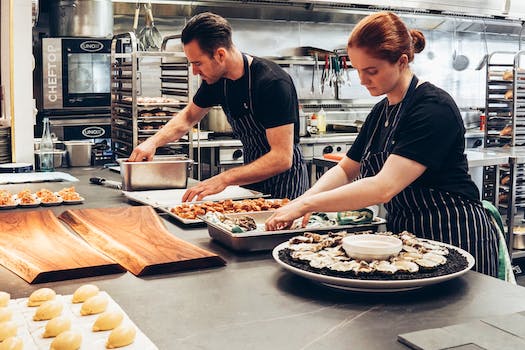How To Start A Kitchen Business
“From recipe to profit: A beginner’s guide to launching a successful kitchen business.”
Introduction
Starting a kitchen business can be a challenging but rewarding venture. Whether you’re interested in opening a restaurant, catering service, or food truck, there are several key steps you’ll need to take to get started. In this article, we’ll provide an overview of the process and offer some tips to help you launch your kitchen business successfully.
Finding Your Niche in the Kitchen Business
Starting a kitchen business can be a daunting task, but with the right mindset and approach, it can be a fulfilling and profitable venture. One of the first steps in starting a kitchen business is finding your niche. This means identifying the specific area of the kitchen industry that you want to focus on and excel in.
There are many different niches within the kitchen industry, including catering, baking, meal prep, and more. To find your niche, start by considering your skills and interests. What are you passionate about? What do you excel at? What unique skills or experiences do you bring to the table?
Once you have identified your niche, it’s important to research the market and competition. Look at what other businesses in your niche are doing and identify areas where you can differentiate yourself. This could be through offering unique products or services, providing exceptional customer service, or targeting a specific demographic.
Another important aspect of finding your niche is understanding your target audience. Who are you trying to reach with your products or services? What are their needs and preferences? By understanding your target audience, you can tailor your offerings to meet their specific needs and stand out in a crowded market.
In addition to researching the market and competition, it’s also important to consider the financial aspects of your niche. How much will it cost to start and run your business? What are the potential revenue streams? Will you need to invest in equipment or supplies? By understanding the financial implications of your niche, you can make informed decisions about how to structure your business and set realistic goals.
Once you have identified your niche and done your research, it’s time to start building your brand. This includes developing a unique name and logo, creating a website and social media presence, and establishing a strong online presence. By building a strong brand, you can attract customers and establish yourself as a leader in your niche.
Finally, it’s important to stay up-to-date with industry trends and developments. This means attending trade shows and conferences, networking with other professionals in your niche, and staying informed about new products and technologies. By staying on top of industry trends, you can continue to innovate and grow your business over time.
In conclusion, finding your niche is a critical step in starting a successful kitchen business. By identifying your skills and interests, researching the market and competition, understanding your target audience, considering the financial implications, building a strong brand, and staying up-to-date with industry trends, you can position yourself for success in the competitive world of the kitchen industry. With hard work, dedication, and a passion for your niche, you can build a thriving business that brings joy and satisfaction to both you and your customers.
Creating a Business Plan for Your Kitchen Business

Starting a kitchen business can be an exciting and rewarding venture. However, before you dive in, it’s important to create a solid business plan that will guide you through the process. A business plan is a roadmap that outlines your goals, strategies, and financial projections. It’s a crucial document that will help you secure funding, attract investors, and stay on track as you build your business.
The first step in creating a business plan for your kitchen business is to define your vision and mission. What do you want to achieve with your business? What sets you apart from your competitors? Your vision and mission should be clear, concise, and inspiring. They should reflect your values and your passion for food and cooking.
Next, you need to conduct market research to identify your target audience and assess the demand for your products or services. Who are your potential customers? What are their needs and preferences? What are the trends in the food industry? This information will help you develop a marketing strategy that will reach your target audience and differentiate your business from others.
Once you have a clear understanding of your market, you need to develop a product or service that meets the needs of your customers. This could be a catering service, a meal delivery service, a cooking school, or a food truck. Whatever your business model, you need to ensure that your products or services are high-quality, innovative, and affordable.
In addition to your products or services, you also need to consider your pricing strategy. How much will you charge for your products or services? Will you offer discounts or promotions? How will you compete with other businesses in your market? Your pricing strategy should be based on your costs, your target audience, and your competitors.
Another important aspect of your business plan is your marketing strategy. How will you promote your business and attract customers? Will you use social media, email marketing, or traditional advertising? How will you measure the success of your marketing efforts? Your marketing strategy should be tailored to your target audience and your budget.
Finally, you need to develop a financial plan that outlines your startup costs, your revenue projections, and your cash flow. This will help you determine how much funding you need to start your business and how long it will take to break even. You should also consider your funding options, such as loans, grants, or investors.
In conclusion, creating a business plan for your kitchen business is a crucial step in building a successful and sustainable business. It requires careful research, planning, and execution. By defining your vision and mission, conducting market research, developing high-quality products or services, pricing them appropriately, and promoting them effectively, you can build a thriving business that meets the needs of your customers and your community.
Setting Up Your Kitchen Business: Equipment and Supplies
Starting a kitchen business can be an exciting and rewarding venture. However, it can also be a daunting task, especially when it comes to setting up your kitchen. The equipment and supplies you choose will play a crucial role in the success of your business. In this article, we will guide you through the process of setting up your kitchen business by discussing the essential equipment and supplies you need.
Firstly, you need to consider the type of kitchen business you want to start. Will you be running a bakery, a restaurant, or a catering service? The type of business you choose will determine the equipment and supplies you need. For instance, if you are starting a bakery, you will need an oven, a mixer, baking sheets, and other baking tools. On the other hand, if you are starting a restaurant, you will need a stove, a grill, a deep fryer, and other cooking equipment.
Once you have determined the type of kitchen business you want to start, the next step is to create a list of essential equipment and supplies. Some of the essential equipment you need include refrigerators, freezers, sinks, and worktables. You also need to consider the size of your kitchen and the number of customers you expect to serve. This will help you determine the size and capacity of the equipment you need.
When it comes to supplies, you need to consider the type of food you will be serving. For instance, if you are starting a bakery, you will need flour, sugar, yeast, and other baking ingredients. If you are starting a restaurant, you will need spices, sauces, and other cooking ingredients. You also need to consider the packaging and storage supplies you need, such as containers, bags, and labels.
Another important factor to consider when setting up your kitchen business is the quality of the equipment and supplies you choose. You need to invest in high-quality equipment and supplies that will last long and perform well. This will not only save you money in the long run but also ensure that your food is of high quality and your customers are satisfied.
In addition to essential equipment and supplies, you also need to consider safety and hygiene. You need to ensure that your kitchen is clean and free from any hazards that may cause accidents or food contamination. You also need to invest in safety equipment such as fire extinguishers, first aid kits, and safety signs.
Finally, you need to consider the cost of setting up your kitchen business. The cost will depend on the type of business you choose, the size of your kitchen, and the equipment and supplies you need. You need to create a budget and stick to it. You can also consider leasing equipment or buying used equipment to save money.
In conclusion, setting up a kitchen business requires careful planning and consideration. You need to determine the type of business you want to start, create a list of essential equipment and supplies, consider the quality of the equipment and supplies, ensure safety and hygiene, and consider the cost. By following these steps, you can set up a successful kitchen business that will provide high-quality food and satisfy your customers.
Marketing Your Kitchen Business: Strategies and Techniques
Starting a kitchen business can be a daunting task, but with the right strategies and techniques, you can successfully market your business and attract customers. In this article, we will discuss some effective marketing strategies that can help you grow your kitchen business.
1. Define Your Target Market
The first step in marketing your kitchen business is to define your target market. Who are your ideal customers? What are their needs and preferences? By understanding your target market, you can tailor your marketing efforts to reach them effectively.
2. Develop a Brand Identity
Your brand identity is what sets you apart from your competitors. It includes your logo, color scheme, and overall aesthetic. Develop a brand identity that reflects your business values and appeals to your target market. Make sure your brand identity is consistent across all marketing channels, including your website, social media, and advertising materials.
3. Build a Website
In today’s digital age, having a website is essential for any business. Your website should be user-friendly, visually appealing, and provide all the necessary information about your kitchen business. Make sure your website is optimized for search engines so that potential customers can easily find you online.
4. Utilize Social Media
Social media is a powerful marketing tool that can help you reach a wider audience. Create social media accounts for your kitchen business and regularly post engaging content that appeals to your target market. Use social media to showcase your products, share recipes, and interact with your followers.
5. Offer Promotions and Discounts
Everyone loves a good deal, so offering promotions and discounts can be an effective way to attract new customers. Consider offering a discount on a customer’s first purchase or running a promotion during a holiday or special event.
6. Attend Trade Shows and Events
Attending trade shows and events is a great way to network with other professionals in the industry and showcase your products to potential customers. Make sure you have plenty of business cards and promotional materials to hand out at these events.
7. Partner with Influencers
Partnering with influencers can help you reach a wider audience and build credibility for your kitchen business. Look for influencers in your industry who have a large following and align with your brand values. Offer them free products or services in exchange for promoting your business on their social media channels.
8. Get Involved in the Community
Getting involved in the community is a great way to build relationships with potential customers and show your support for local causes. Consider sponsoring a local event or donating your products or services to a charity auction.
In conclusion, marketing your kitchen business requires a combination of strategies and techniques. By defining your target market, developing a brand identity, building a website, utilizing social media, offering promotions and discounts, attending trade shows and events, partnering with influencers, and getting involved in the community, you can successfully grow your business and attract new customers. Remember to be consistent in your marketing efforts and always put your customers first.
Managing Your Kitchen Business: Tips for Success
Starting a kitchen business can be a daunting task, but with the right mindset and approach, it can be a fulfilling and profitable venture. Whether you’re looking to start a catering business, a food truck, or a restaurant, there are a few key steps you need to take to ensure your success.
First and foremost, you need to have a clear vision of what you want your kitchen business to be. This means defining your niche, identifying your target market, and understanding your competition. Are you going to specialize in a particular cuisine or type of food? Who are your ideal customers, and what are their needs and preferences? What sets you apart from other kitchen businesses in your area?
Once you have a clear vision, you need to develop a solid business plan. This should include your goals, strategies, financial projections, and marketing plan. You’ll need to determine your startup costs, including equipment, supplies, and licensing fees, as well as your ongoing expenses, such as rent, utilities, and payroll. You’ll also need to decide on your pricing strategy, taking into account your costs, your competition, and your target market.
One of the most important aspects of managing a kitchen business is maintaining high standards of food safety and hygiene. This means following all local health codes and regulations, training your staff on proper food handling and storage, and regularly inspecting your kitchen for cleanliness and sanitation. You’ll also need to keep detailed records of your food inventory, preparation, and storage, as well as any incidents or complaints.
Another key factor in the success of your kitchen business is your staff. You’ll need to hire and train a team of skilled and reliable employees who share your vision and values. This includes chefs, cooks, servers, and other support staff. You’ll also need to establish clear roles and responsibilities, provide ongoing training and feedback, and create a positive and supportive work environment.
Marketing and promotion are also essential to the success of your kitchen business. You’ll need to develop a strong brand identity, including a logo, website, and social media presence. You’ll also need to create a marketing plan that includes advertising, promotions, and events. This may include participating in local food festivals, hosting cooking classes or workshops, or partnering with other businesses or organizations.
Finally, you’ll need to stay on top of your finances and operations. This means tracking your sales and expenses, managing your cash flow, and making adjustments as needed. You’ll also need to stay up-to-date on industry trends and best practices, and be willing to adapt and innovate as necessary.
Starting a kitchen business can be a challenging and rewarding experience. By following these tips and staying focused on your vision and goals, you can build a successful and sustainable business that brings joy and satisfaction to both you and your customers.
Conclusion
Starting a kitchen business requires careful planning, research, and execution. It is important to identify your target market, create a unique brand, and develop a solid business plan. You will also need to consider the legal and financial aspects of starting a business, such as obtaining necessary licenses and permits, securing funding, and managing expenses. With dedication and hard work, starting a kitchen business can be a rewarding and profitable venture.






